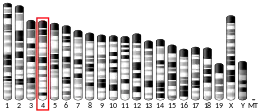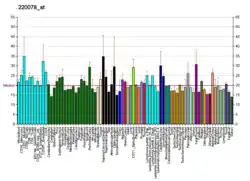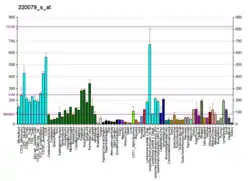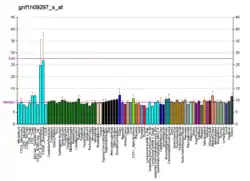USP48
Ubiquitin carboxyl-terminal hydrolase 48 is an enzyme that in humans is encoded by the USP48 gene.[5][6]
This gene encodes a protein containing domains that associate it with the peptidase family C19, also known as family 2 of ubiquitin carboxyl-terminal hydrolases. Family members function as deubiquitinating enzymes, recognizing and hydrolyzing the peptide bond at the C-terminal glycine of ubiquitin. Enzymes in peptidase family C19 are involved in the processing of poly-ubiquitin precursors as well as that of ubiquitinated proteins. Alternate transcriptional splice variants, encoding different isoforms, have been characterized.[6]
In melanocytic cells USP48 gene expression may be regulated by MITF.[7]
References
- GRCh38: Ensembl release 89: ENSG00000090686 - Ensembl, May 2017
- GRCm38: Ensembl release 89: ENSMUSG00000043411 - Ensembl, May 2017
- "Human PubMed Reference:". National Center for Biotechnology Information, U.S. National Library of Medicine.
- "Mouse PubMed Reference:". National Center for Biotechnology Information, U.S. National Library of Medicine.
- Puente XS, Sanchez LM, Overall CM, Lopez-Otin C (Jul 2003). "Human and mouse proteases: a comparative genomic approach". Nat Rev Genet. 4 (7): 544–58. doi:10.1038/nrg1111. PMID 12838346. S2CID 2856065.
- "Entrez Gene: USP48 ubiquitin specific peptidase 48".
- Hoek KS, Schlegel NC, Eichhoff OM, et al. (2008). "Novel MITF targets identified using a two-step DNA microarray strategy". Pigment Cell Melanoma Res. 21 (6): 665–76. doi:10.1111/j.1755-148X.2008.00505.x. PMID 19067971.
Further reading
- Wilkinson KD (1998). "Regulation of ubiquitin-dependent processes by deubiquitinating enzymes". FASEB J. 11 (14): 1245–56. doi:10.1096/fasebj.11.14.9409543. PMID 9409543. S2CID 11788220.
- Strausberg RL, Feingold EA, Grouse LH, et al. (2003). "Generation and initial analysis of more than 15,000 full-length human and mouse cDNA sequences". Proc. Natl. Acad. Sci. U.S.A. 99 (26): 16899–903. Bibcode:2002PNAS...9916899M. doi:10.1073/pnas.242603899. PMC 139241. PMID 12477932.
- Ota T, Suzuki Y, Nishikawa T, et al. (2004). "Complete sequencing and characterization of 21,243 full-length human cDNAs". Nat. Genet. 36 (1): 40–5. doi:10.1038/ng1285. PMID 14702039.
- Quesada V, Díaz-Perales A, Gutiérrez-Fernández A, et al. (2004). "Cloning and enzymatic analysis of 22 novel human ubiquitin-specific proteases". Biochem. Biophys. Res. Commun. 314 (1): 54–62. doi:10.1016/j.bbrc.2003.12.050. PMID 14715245.
- Suzuki Y, Yamashita R, Shirota M, et al. (2004). "Sequence comparison of human and mouse genes reveals a homologous block structure in the promoter regions". Genome Res. 14 (9): 1711–8. doi:10.1101/gr.2435604. PMC 515316. PMID 15342556.
- Lockhart PJ, Hulihan M, Lincoln S, et al. (2004). "Identification of the human ubiquitin specific protease 31 (USP31) gene: structure, sequence and expression analysis". DNA Seq. 15 (1): 9–14. doi:10.1080/10855660310001638197. PMID 15354349. S2CID 36992328.
- Gerhard DS, Wagner L, Feingold EA, et al. (2004). "The status, quality, and expansion of the NIH full-length cDNA project: the Mammalian Gene Collection (MGC)". Genome Res. 14 (10B): 2121–7. doi:10.1101/gr.2596504. PMC 528928. PMID 15489334.
- Tzimas C, Michailidou G, Arsenakis M, et al. (2006). "Human ubiquitin specific protease 31 is a deubiquitinating enzyme implicated in activation of nuclear factor-kappaB". Cell. Signal. 18 (1): 83–92. doi:10.1016/j.cellsig.2005.03.017. PMID 16214042.
- Gregory SG, Barlow KF, McLay KE, et al. (2006). "The DNA sequence and biological annotation of human chromosome 1". Nature. 441 (7091): 315–21. Bibcode:2006Natur.441..315G. doi:10.1038/nature04727. PMID 16710414.
- Olsen JV, Blagoev B, Gnad F, et al. (2006). "Global, in vivo, and site-specific phosphorylation dynamics in signaling networks". Cell. 127 (3): 635–48. doi:10.1016/j.cell.2006.09.026. PMID 17081983. S2CID 7827573.
This article is issued from Wikipedia. The text is licensed under Creative Commons - Attribution - Sharealike. Additional terms may apply for the media files.






